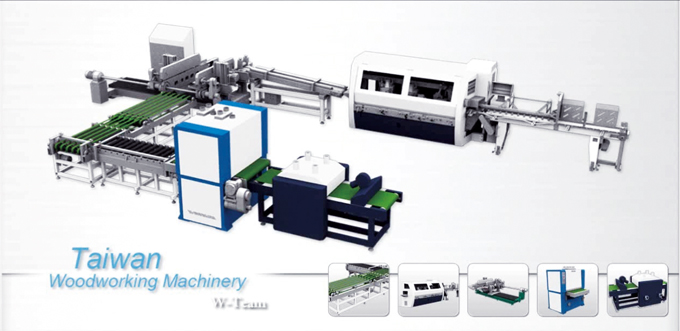Project to Help Add Value to Taiwan's Woodworking Machine Industry
Program aims to push local makers toward achieving three goals
2013/09/11 | By Ken LiuStarting this year, Taiwan's Ministry of Economic Affairs (MOEA) will also target woodworking-machine industry as part of its official plan focusing on reinvigorating Taiwan's traditional industries by enhancing added-value.
The plan attempts to push the woodworking-machine line to pursue three goals: to build innovative operational model, use information-communications technology (ICT) to enhance manufacturing service, and develop turnkey plant know-how.
A key motivator of this plan is the reckless underselling by Chinese equipment manufacturers, who are practically destroying profitability of Taiwanese manufacturers.
According to Director General J.C. Shen of the Ministry's Industrial Development Bureau (IDB), Taiwan's woodworking-machine industry must evade competing against low-end Chinese makers whose forte is single-function machines when Taiwan moves towards becoming the world's No.2 woodworking-machine exporter by 2016. Taiwan has unseated China as the No.3 exporter in 2011, with export value of around NT$20 billion (US$666 million) yearly.
The plan will help the Taiwanese manufacturers develop turnkey plant solutions based on customer needs, set up Internet-connected product catalogs and company index to conveniently promote products overseas, integrate ICT in machines, as well as set up W-Team brands and woodworking-machine version of MIT (Made-in-Taiwan) Labeling System.
Mostly Industrial Engineering
According to Shen, developing turnkey plants is mainly of production layout planning, equipment operational control and service, and peripheral equipment development. Such services include application-software planning, calculation of production line footprint, processing-flow planning, capacity analysis and personnel arrangement.
Equipment operational control and service include remote monitoring and troubleshooting. Peripheral equipment includes wood-waste recycling facilities.
Last year, some 50 of Taiwan's woodworking-machine makers formed the W-Team to develop turnkey plants, having unveiled a turnkey line for solid-wood flooring production as real-world working model, composed of a four-side molder, double-end tenon jointer, sander, wood-dust collector, and central vacuum.
The model is an automated solution that promises a dust-free floor throughout production, able also to achieve 30% more output with only three machine operators, better than the seven normally required.
This working model goes for twice as much as a single-function machine. The alliance plans to ship 100 of the flooring line to China in three years, generating an estimated NT$1 billion (US$33 million) in revenue for Taiwan's woodworking-machine industry.
The 3D virtual version of this model online will significantly help Taiwan's manufacturers to promote woodworking equipment turnkey capabilities to Chinese buyers.
T.J. Duh, a former IDB Director General and incumbent Vice Economic Minister, says that selling turnkey production lines will allow Taiwan's woodworking-machinery industry to enhance added-value, transforming it to a total-solution provider from a pure contract-manufacturing provider, also shedding any worries of losing orders to single-function machines.
After introducing the frontend production line the Ministry will help the team develop automated turnkey finger-jointing line and line for making plywood furniture.
By introducing automated turnkey solutions to frontend, mid-end and backend production of the woodworking industry, the industry revitalization plan aims to double and quintuple prices over single-function solutions.

With over 80% of Taiwan's some 300 woodworking-machinery makers clustered in central Taiwan to offer convenient access to needed parts, services and tech support, the Taiwan industry has advantages to develop turnkey solutions with integrated strength such as the W-Team.
While Taiwan's woodworking-machinery makers remain relatively small in scale, such “weakness” actually works for them due to a proven track-record in fast response to market changes. The reinvigoration plan will accelerate the manufacturers' step into the high value-added automation sector, says J.W. Lee, chairman of Formosa Kuang Yung Enterprises Co., Ltd.
Chairman of Taiwan Woodworking Machinery Association (TWMA), S.C. Po, notes that woodworking machinery actually encompasses a wide range of woodworking facilities, including ones for forestry, to secondary processing and recycling. Regardless of extreme diversification of the machinery, Taiwan's equipment manufacturers can deliver orders with short lead-times backed by good quality and competitive prices, with some equipment even qualitatively exceeding those made in the West, he says.
Po says that with China's rising woodworking machinery industry and increasingly diversified customer needs, the Taiwan industry needs to move towards teamwork to develop automated turnkey solutions, instead of relying on independent effort to develop single-function machines, he stresses.
Competition from China and versatile customer needs aside, Cheng Kuang Wood Machinery Works Co., Ltd. chairman and former TWMA chairman, C.L. Tu says that market slowdown caused by the European sovereignty debt crisis and Southeast Asian buyers increasingly diverting orders to China for low-priced machines have also impacted Taiwan's woodworking-machinery industry.
Top-4 Exporters
According to Taiwan's customs office, in 2012 the world shipped US$6.58 billion of woodworking machines, with Germany seeing a 2.4% decline, Italy an 8% drop, China a 5% decrease and Taiwan a 10% slump year on year, all of which being the top-4 exporters.
Tu says that an increasing number of Southeast Asian buyers have shifted to Chinese manufacturers for machines, which look similar to Taiwan-made machines but are more cost effective. He suggests that, in addition to offering automated turnkey solutions and better pricing, Taiwan's woodworking-machinery industry should take advantage of information-communication technology (ICT) and cloud-computing technology to build interactive online catalogs to make online promotion globally easy with any mobile computing device.
Automated production line may also be welcomed by Taiwan's furniture makers. Taya Kitchen Utensil Co., Ltd. Chairman K.N. Chang says that his company, a leading kitchen-furniture manufacturer in Taiwan, may adopt locally developed woodworking machines if local manufacturers further integrate to introduce turnkey plants featuring smart control software, high output and lower labor intensity.
“Initially around our 1978 establishment, we used imported, heavy-duty equipment, but the self-content rate has reached 30% after local machine builders have developed products to match foreign-made machines in processing accuracy,” Chang says.




